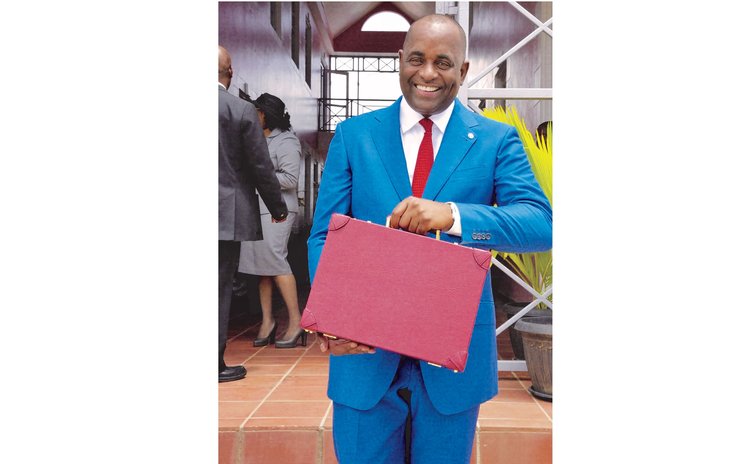Government's new budget will tell us how Dominica will deal with the fallout of COVID-19. Keep your fingers crossed

Government's financial year ends on June 30, 2020, that is in about one week's time. But as usual not a whisper has been heard- Dominicans are absolutely silent- about this unquestionably crucial budget for fiscal year 2020-2021.
This budget is not only important because it is this administration's first budget since the general election of December 2019, it comes during the COVID-19 pandemic and theoretically gives Dominicans a road map to the recovery of an economy battered by the coronavirus.
In addition, the budget, that we anticipate will be delivered in mid- July, will be Prime Minister Roosevelt Skerrit's second chance at indicating to Dominicans how his government expects to get the Dominican economy moving upwards next year and for the foreseeable future.
Mr. Skerrit's first opportunity was the highly anticipated and widely criticised stimulus package proposal that he delivered on 17 May, 2020 in an address to the nation. A budget at this time is an extremely serious business, one that will affect every person on this "Isle beyond compare".
Whenever Mr. Skerrit presents Government's budget for the new fiscal year we hope, really hope, that he will tell Dominicans clearly and truthfully about the state of the economy because we cannot collectively confront this malaise unless we understand the extent of the problem. Knowledge is power. You know that a drunkard cannot cure his weakness for alcohol unless he concedes that "Bwoy, de rum killin' me". Denial won't work; living on Fantasy Island won't work either; putting the blame of the nation's economic disaster on the shoulder of another political party that has been out of power for 20 years, definitely won't work.
From the National Resilience Development Strategy (NRDS) -Table of Key Economic Indicators-2006-2016) we learn that the economy has been in intensive care for seven years, that it up to 2016. According to that document, the economy showed negative growth in 2012 (-0.84%) and 2015 (-2.46%). Additionally, growth of Gross Domestic Product (GDP) for the other years was not much to shout about either- 2010 (0.74%); 2011 (0.84%); 2013 (0.27%); 2014 (4.03%); and 2016: 2.75%.
Yet the authors of the NRDS suggest: "In a broad sense, except for a couple of years, Dominica has witnessed steady macroeconomic growth…" We are at pains to figure out how the NRDS arrived at that conclusion and that is exactly what we were referring to when we suggested that we have to exorcise the fantasies before we make any progress.
So, we look forward to see how Mr. Skerrit deals with a few issues in this new budget.
First, there is the international airport, resurrected by Skerrit for every general election. His promises have been many while delivery remains elusive. In November 2013, a little over a year before the last election, he reportedly signed a US$300 million agreement with the Chinese firm, Anhui Shui An Construction Group, to include construction of the airport at Crompton Point.
Less than a month later, he boasted of the presence of a delegation from the company "to visit the site, to review documentations" in preparation for the signing of a memorandum of understanding, after which "we will engage the firm in further discussions as far as cost is concerned". Last August, he announced that he had put aside "over $200 million" from the citizenship by investment programme for the construction of the airport, which, by some estimates, is expected to cost in excess of $1 billion.
That promise to put money aside for the construction of an international airport was apparently ignored because Mr. Skerrit has snubbed a suggestion by the opposition United Workers Party to use that saving to stimulate the COVID-19 battered economy.
In addition, we look forward to hear how Mr. Skerrit handles the controversial issue of the legalisation and commercialization of cannabis, a major promise in the 2019 election campaign and in the 2019-2020 budget address.
And what about the much-talked-about- but-perpetually- underfunded agricultural sector?
As we wrote last year, and we restate today, we believe that much of the money from the sale of the State's passports would have been better spent in making real, intensive, and persistent efforts at reviving agriculture: building feeder roads; setting up market arrangements; instituting research; developing farmer education programmes; controlling pests and diseases; erecting irrigation systems and establishing food processing plants.
Instead we built luxury hotels that COVID-19 has transformed into white elephants.
In the past budget presentation Government's main money-earner was not taxes but the selling of passports. Inevitably, this will continue as sales taxes, income taxes and Value Added Taxes (VAT) wilt in the heat of COVID-19.
Here's an important question: Will Prime Minister Skerrit have the courage to cut government's expenditure during this fiscal year, especially his huge, triple x large cabinet and many advisers, even as an example for the rest of the population who need to tighten their belts during this upcoming economic depression?
Again recall that during the last budget presentation, the UWP said it had discovered that a sum of $1.2 billion was not properly accounted for and that alleged discrepancy formed the basis for much acrimony especially during the last election campaign. So far there has been no public enquiry into the matter, and so, expect the UWP to pour a barrel of salt in this wound during the budget rebuttal.
But our loud silence on this budget and what it means during this COVID-19 period proves again that the majority of Dominicans continue to sleep-walk towards the precipice of economic disaster. We live in such a politically induced fantasy world that not even an impending crash to the bottom of the economic cliff will wake us up.




